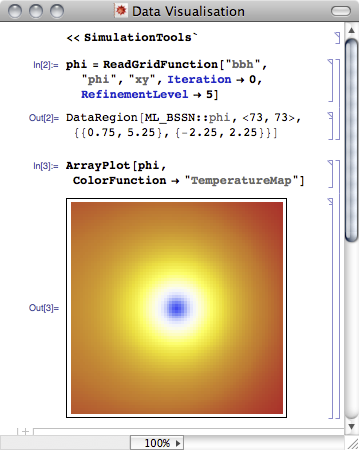Difference between revisions of "Analysis and post-processing"
(→Example) |
|||
| Line 2: | Line 2: | ||
This page collects information on existing tools which can be used to analyse data produced using the Einstein Toolkit. See also [Visualization of simulation results]. | This page collects information on existing tools which can be used to analyse data produced using the Einstein Toolkit. See also [Visualization of simulation results]. | ||
| + | |||
| + | __TOC__ | ||
== SimulationTools == | == SimulationTools == | ||
| + | |||
| + | [[Image:datavisualisation.png|right]] | ||
{| class="wikitable" style="text-align:left;" | {| class="wikitable" style="text-align:left;" | ||
| Line 17: | Line 21: | ||
!Requirements | !Requirements | ||
| Mathematica (proprietary) | | Mathematica (proprietary) | ||
| + | |- | ||
| + | !Other info | ||
| + | | [http://simulationtools.org/documentation.shtml Documentation], [https://build.barrywardell.net/view/All/job/SimulationTools/ unit tests] (automatic on commit) | ||
|- | |- | ||
|} | |} | ||
| Line 24: | Line 31: | ||
SimulationTools is available under the GPL and is developed on BitBucket, and would be a good candidate for including in the Einstein Toolkit at some point. | SimulationTools is available under the GPL and is developed on BitBucket, and would be a good candidate for including in the Einstein Toolkit at some point. | ||
| − | + | A more detailed overview of the [http://simulationtools.org/features.shtml features in SimulationTools] is available. | |
| − | |||
| − | [ | ||
Revision as of 02:23, 12 August 2015
(page under construction)
This page collects information on existing tools which can be used to analyse data produced using the Einstein Toolkit. See also [Visualization of simulation results].
Contents
SimulationTools
| Homepage | simulationtools.org |
|---|---|
| Authors | Ian Hinder and Barry Wardell |
| Licence | GPLv2 |
| Requirements | Mathematica (proprietary) |
| Other info | Documentation, unit tests (automatic on commit) |
SimulationTools provides a functional interface to simulation data which deals transparently with merging output from different segments, and can read data from several different thorns, depending on what is available. The package supports reading Carpet HDF5 data and doing the required component-merging etc so that you can do analysis on the resulting data in Mathematica. This supports 1D, 2D and 3D data, but is essentially dimension-agnostic. It has a component called SimView which displays a panel summarising a BBH simulation, including run speed and memory usage as a function of coordinate time, BH trajectories, separation, waveforms, etc. SimulationTools is coupled to a C++ replacement for the Mathematica HDF5 reader.
SimulationTools is available under the GPL and is developed on BitBucket, and would be a good candidate for including in the Einstein Toolkit at some point.
A more detailed overview of the features in SimulationTools is available.
